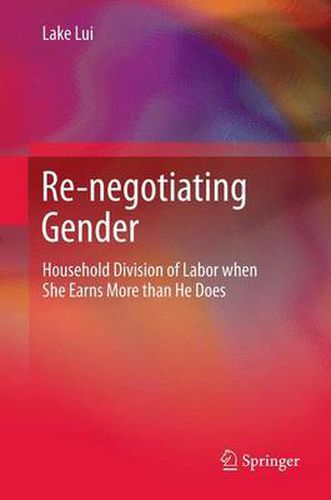Readings Newsletter
Become a Readings Member to make your shopping experience even easier.
Sign in or sign up for free!
You’re not far away from qualifying for FREE standard shipping within Australia
You’ve qualified for FREE standard shipping within Australia
The cart is loading…






This title is printed to order. This book may have been self-published. If so, we cannot guarantee the quality of the content. In the main most books will have gone through the editing process however some may not. We therefore suggest that you be aware of this before ordering this book. If in doubt check either the author or publisher’s details as we are unable to accept any returns unless they are faulty. Please contact us if you have any questions.
In Chinese societies where both money and gender confer power, can a woman’s economic success relative to her husband’s bring about a more equal division of household labor? Lui’s qualitative study of status-reversed Hong Kong families, wherein wives earn more than their husbands, examines how couples re-negotiate household labor in ways that perpetuate male dominance within the family even when the traditional gender expectation that men rule outside, women rule inside (nanzhuwai, nuzhunei) is challenged. Going beyond the dyadic negotiation of household labor, this important study also explores the role of third parties, namely the couples’ children and parents, who actively encourage couples to conform to traditional gender norms, thereby reproducing an unequal division of household labor. Based upon the experiences of families with stay-at-home dads, Lui further identifies a new mechanism of deconstructing gender, by which couples concertedly construct new norms of work and gender that they maintain through daily interactions to fit their atypical relative earnings. As a result, there are sparks of hope that both men and women can be liberated from a set of traditional social norms. Re-negotiating Gender: Household Division of Labor When She Earns More than He Does is essential reading in the fields of family and gender studies, sociology, psychology, and East Asian studies.
$9.00 standard shipping within Australia
FREE standard shipping within Australia for orders over $100.00
Express & International shipping calculated at checkout
This title is printed to order. This book may have been self-published. If so, we cannot guarantee the quality of the content. In the main most books will have gone through the editing process however some may not. We therefore suggest that you be aware of this before ordering this book. If in doubt check either the author or publisher’s details as we are unable to accept any returns unless they are faulty. Please contact us if you have any questions.
In Chinese societies where both money and gender confer power, can a woman’s economic success relative to her husband’s bring about a more equal division of household labor? Lui’s qualitative study of status-reversed Hong Kong families, wherein wives earn more than their husbands, examines how couples re-negotiate household labor in ways that perpetuate male dominance within the family even when the traditional gender expectation that men rule outside, women rule inside (nanzhuwai, nuzhunei) is challenged. Going beyond the dyadic negotiation of household labor, this important study also explores the role of third parties, namely the couples’ children and parents, who actively encourage couples to conform to traditional gender norms, thereby reproducing an unequal division of household labor. Based upon the experiences of families with stay-at-home dads, Lui further identifies a new mechanism of deconstructing gender, by which couples concertedly construct new norms of work and gender that they maintain through daily interactions to fit their atypical relative earnings. As a result, there are sparks of hope that both men and women can be liberated from a set of traditional social norms. Re-negotiating Gender: Household Division of Labor When She Earns More than He Does is essential reading in the fields of family and gender studies, sociology, psychology, and East Asian studies.